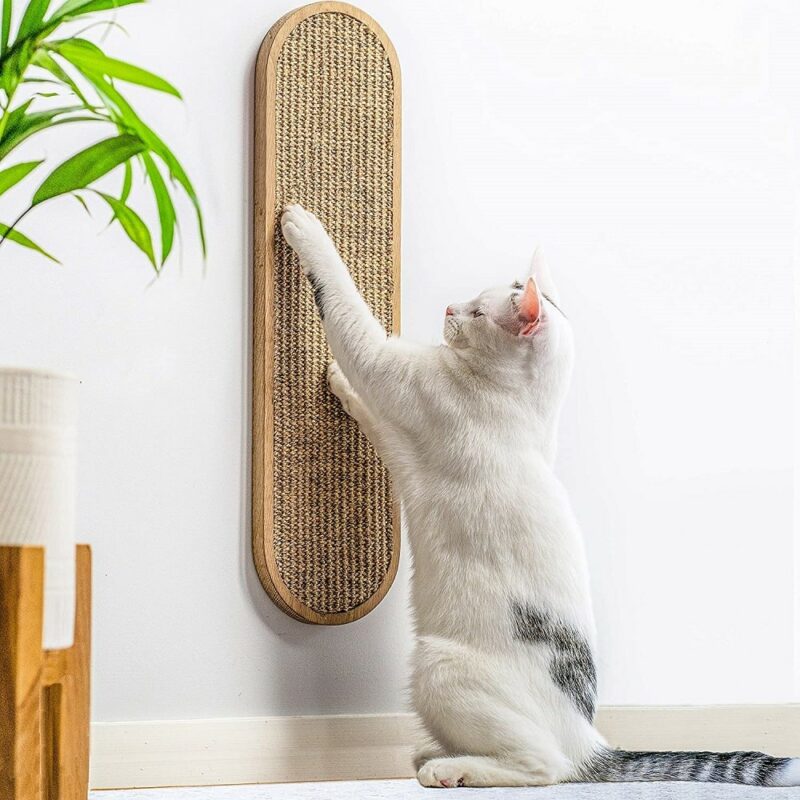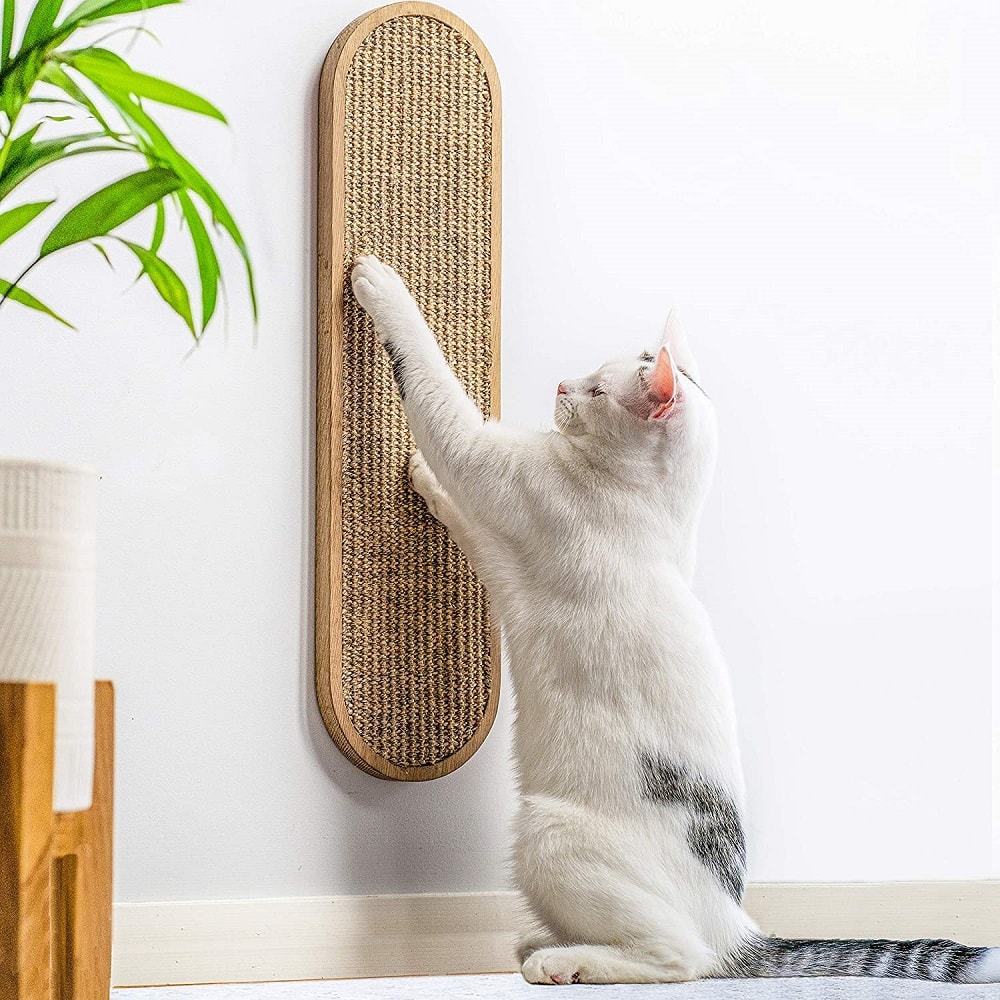
A Quick Look at Our Favorites in 2024
| Image | Product | Details | ||
|---|---|---|---|---|
| Best Overall |

|
Frisco Wall Sisal Cat Scratcher |
|
CHECK PRICE |
| Best Value |

|
Way Basics Eco-friendly Wall Mount Scratch Pad |
|
CHECK PRICE |
| Premium Choice |
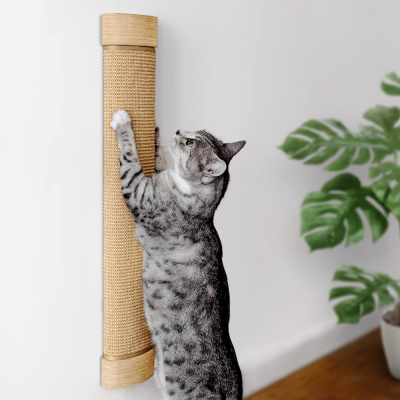
|
7 Ruby Road Wall Mounted Cat Scratching Post |
|
CHECK PRICE |
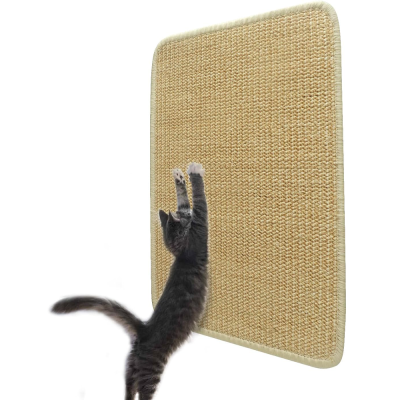
|
Chngna Cat Scratcher Mat |
|
CHECK PRICE | |

|
Ruby Road Cat Scratching Post for Floor or Wall Mounted |
|
CHECK PRICE |
The 8 Best Wall Mounted Cat Scratchers
1. Frisco Wall Sisal Cat Scratcher – Best Overall

Sizing:
- Small–19.29”D x 9.05”H x 1.18”W
- Large–27.15”D x 11”H x 1.18”W
The Frisco wall sisal cat scratcher is the best overall wall mounted cat scratcher on the market this year. The sisal board is able to be laid flat on the floor or mounted on the wall. It can even fold into an angle to go around the corners of walls and furniture. Frisco provides two sizes to fit the needs of any cat–especially those that like to do big, long stretches.
This cat scratcher is made from wood, sisal, and faux fur. The sisal wrapping is deep and sturdy enough that it allows your cats to really dig their nails into the material. If the fabric gets covered in cat fur, all it takes is a quick vacuum run to get it clean again.
Assembly is relatively easy, and mounting options include either screw-in mounting or adhesive hook-and-loops. The one downside to this cat scratcher is that the adhesive won’t last as long as traditional mounting and may have to get replaced eventually. However, for the insanely low price, it’s worth it to purchase some extra adhesive for the future.
- Two sizes
- Cheap
- Use in multiple locations
- Easy mounting
- Adhesive loses stickiness
2. Way Basics Eco-friendly Wall Mount Scratch Pad – Best Value
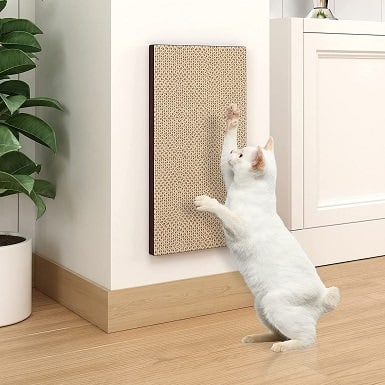
Sizing:
- One size–17.3″D x 7.7″ H x 10.6″W
There are dozens of products that pop up when you search the internet for scratching pads. We think the best wall-mounted cat scratcher for the money is the Ways Basics eco-friendly wall mount pad. The greatest thing about this scratch pad is that it is made from zBoard instead of traditional particle board or cardboard. This board design isn’t only 100% recyclable but is free from toxins and formaldehyde. This material makes the pad lighter than other brands on the market and is less likely to fall off the wall from the weight.
The application of the Ways Basics pad is much easier than others because it is a peel and stick. Mounting it takes literally seconds, and the company offers a lifetime guarantee that it works.
The bad news about peel and stick products is that removing them is a bit tricky. Sometimes taking these types of products off the wall damaging the paint and drywall underneath and might require you to do some touch-ups if you decide to move it around. However, for the price, it’s hard to pass on this cat scratcher.
- Cheap
- Board material
- Lifetime guarantee
- Placed anywhere around home
- Toxin-free
- Might damage walls when removed
- No peel-and-stick replacements
3. 7 Ruby Road Wall Mounted Cat Scratching Post – Premium Choice
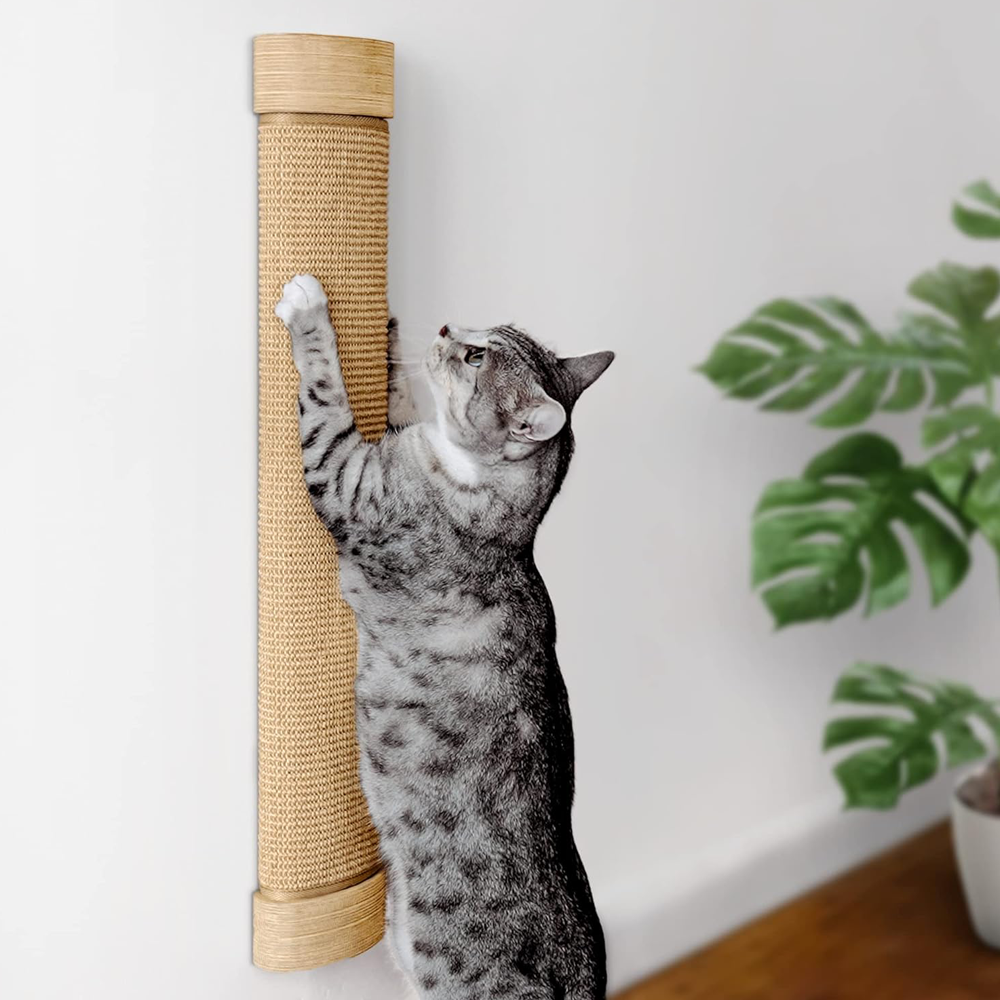
Sizing:
- One size– 2.5”D x 29.5”H x 6”W
This wall mounted cat scratching post by 7 Ruby Road is our premium choice for cat scratching posts. It has a large, curved design with a wider, more rounded surface to make it more enjoyable for cats to scratch. It’s also 29.5 inches tall, so it’s great for cats of any breed, but especially for larger breeds such as the Maine Coon.
The scratching pad is made of durable sisal material, and you can buy replacement pads from the 7 Ruby Road Amazon storefront when the original pad gets worn out from all of your cat’s scratching. It also has a nice look to it, so it won’t stand out too much and the colors and materials should blend in well with any home decor.
This product is a little pricey compared to other wall mounted scratching post options, but we think the price is fair due to the quality. The company does mention that this post may not be a good option for kittens though, due to the height. A kitten will grow into it, but you may need something smaller and less expensive until your kitten grows into an adult cat.
- Great for all cat breeds
- Scratching pad can be replaced
- Larger, curved scratching surface
- Pricey
- Not suitable for kittens
4. Chngna Cat Scratcher Mat – Best for Kittens
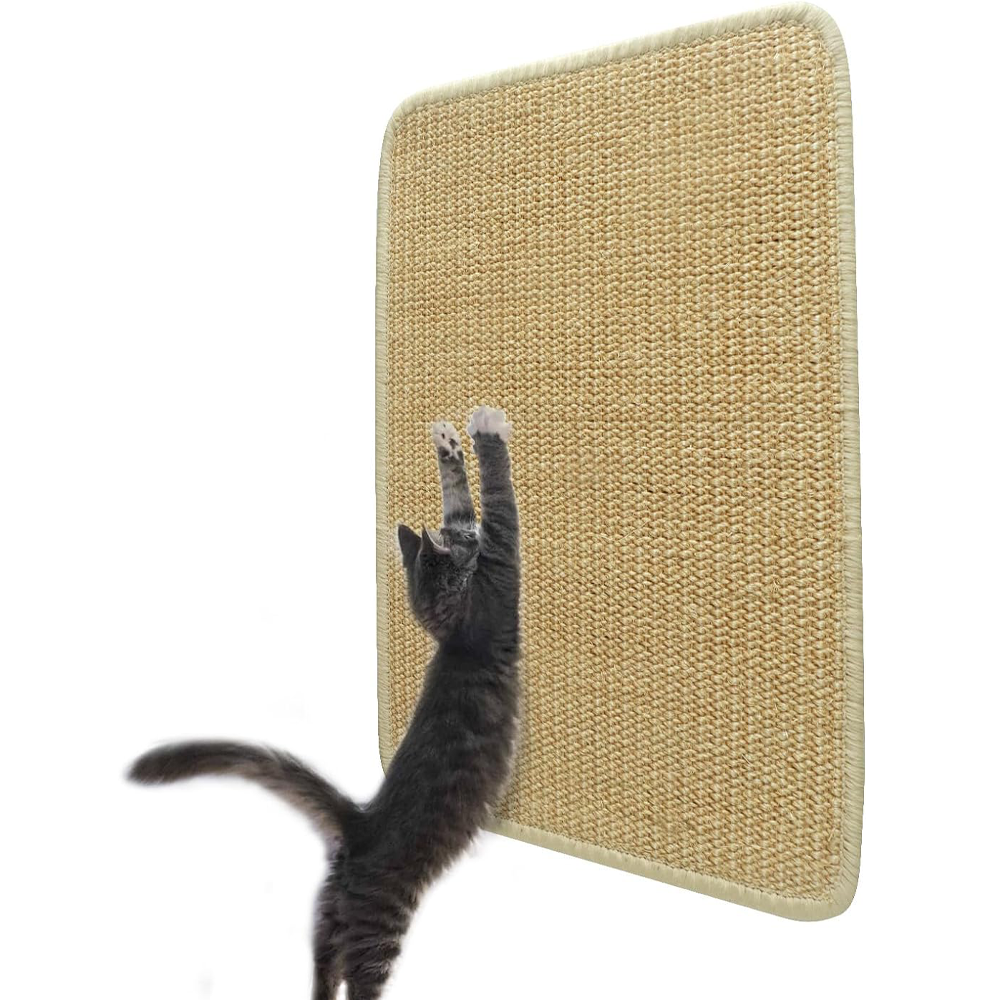
Sizing:
- One size– 1”D x 15.7”L x 11.8”W
If you have a kitten on your hands, we like the Chngna Cat Scratcher Mat as the best wall mounted cat scratcher for kittens. What we love about this scratcher is that it can be mounted as high or low on the wall as you want it, and it can also be mounted on doors or even on the sides of furniture. So, any kitten should be able to use it. You can also turn it either horizontally or vertically if you want to give your cat a larger or smaller scratching surface.
We do have to say that even though this cat scratcher can be mounted on the wall, it attaches with adhesive Velcro strips instead of screws like other wall mounted scratching posts. So, it may not be as secure, but since it’s just a mat that is pretty lightweight, being made of sisal hemp, it is unlikely to injure your cat if it does fall. Also, the Velcro shouldn’t leave any adhesive residue behind if you decide to remove it, but it may peel the paint off of some surfaces.
- Lightweight material
- Can be turned horizontally or vertically
- Can be mounted to surfaces other than walls
- Velcro may not be as secure
- May pull paint off of some surfaces when removed
5. 7 Ruby Road Cat Scratching Post for Floor or Wall Mounted Use
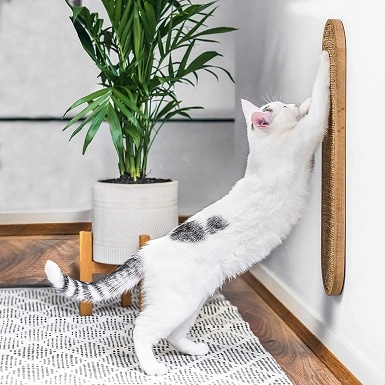
Sizing:
- One size–1″D x 22″ H x 5.75″W
Here is another great design-forward scratching posts made by 7 Ruby Road. This board uses natural wood and sisal with rounded corners for a modern and simplistic look.
This scratching post is perfect for mounting to the wall or setting directly on the floor. The board comes with floor pads so that it doesn’t scratch the floors underneath. If you choose to mount it, it comes with screws and wall plugs. Unlike some other reviews on the list, this one is easy to set up or take down so that you can move it whenever your cats need a change of scenery.
While this board is long-lasting, the glue isn’t strong enough to last a lifetime. After some regular wear-and-tear or being used by heavy scratchers, the sisal may start peeling off the wood. While the sisal is natural, it is also wound incredibly tightly so not all cats love using it. These are definitely some things you may want to consider before paying the high price of it.
- Beautiful design
- Won’t scratch floors
- Easy to mount or remove
- Sisal peels off eventually
- Material knit very tightly
- Higher price point
6. FUKUMARU Cat Activity Tree
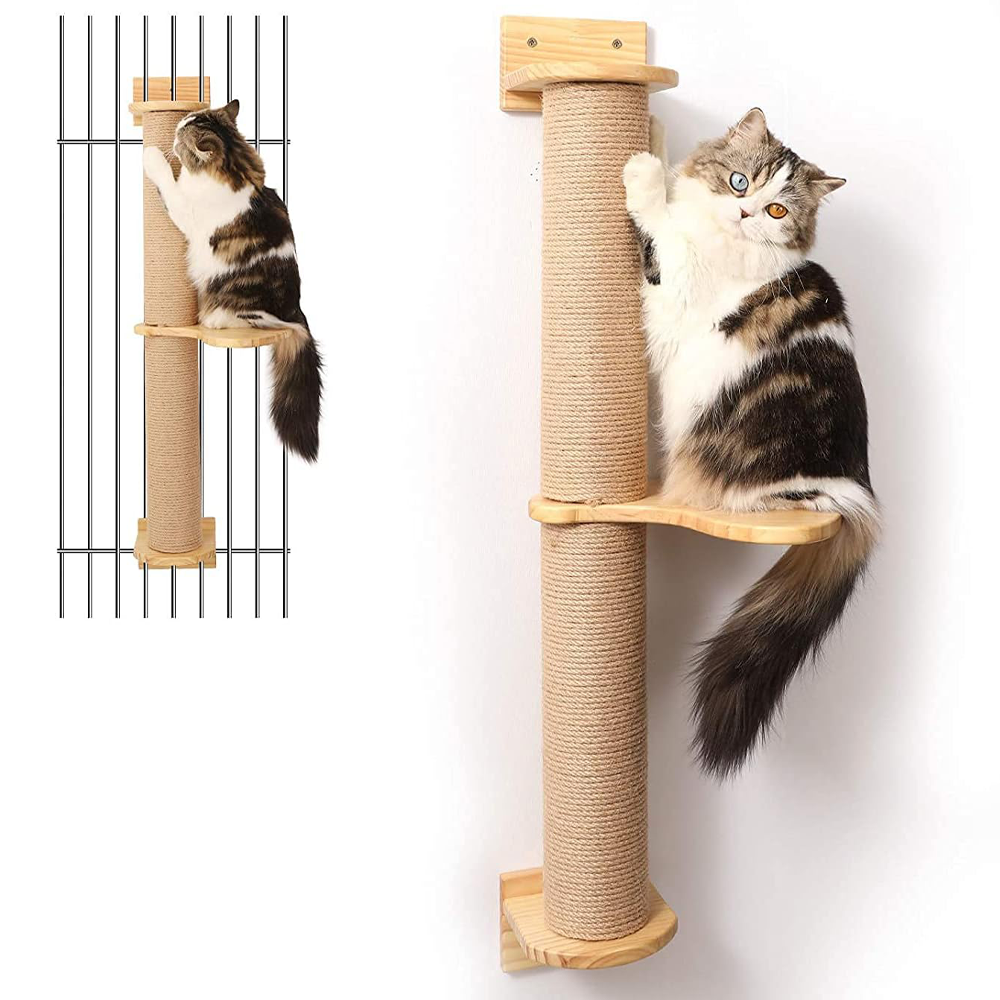
Sizing:
- One size– 36.6”H x 3.5”W; 12.8”W platform
Another great scratching post option if you have a particularly active cat is this FUKUMARU wall-mounted cat activity tree. It is essentially two scratching posts with a platform in the middle for your cat to sit on. So, you can mount it lower to the floor, or higher up on the wall to give your cat the opportunity to jump onto the platform. The scratching posts themselves are 360-degree rotatable, while the platform is 180-degree rotatable, so you can simply spin the scratching posts and allow your cat a new area to scratch.
This scratching post has four fixing points for added stability. It’s also made of natural pine wood and jute rope for durability. However, the platform may be too small for larger cats, and if you mount this tree too high on the wall, your cat may not be able to use the bottom scratching post. But, you could flip it over if the top post gets worn out. This is just something to keep in mind.
- Has a platform
- Platform and posts are rotatable
- Designed for more stability and durability
- Platform may be too small for larger cats
- Must carefully consider how high you mount it
7. Xympo Wall Mounted Cat Scratcher
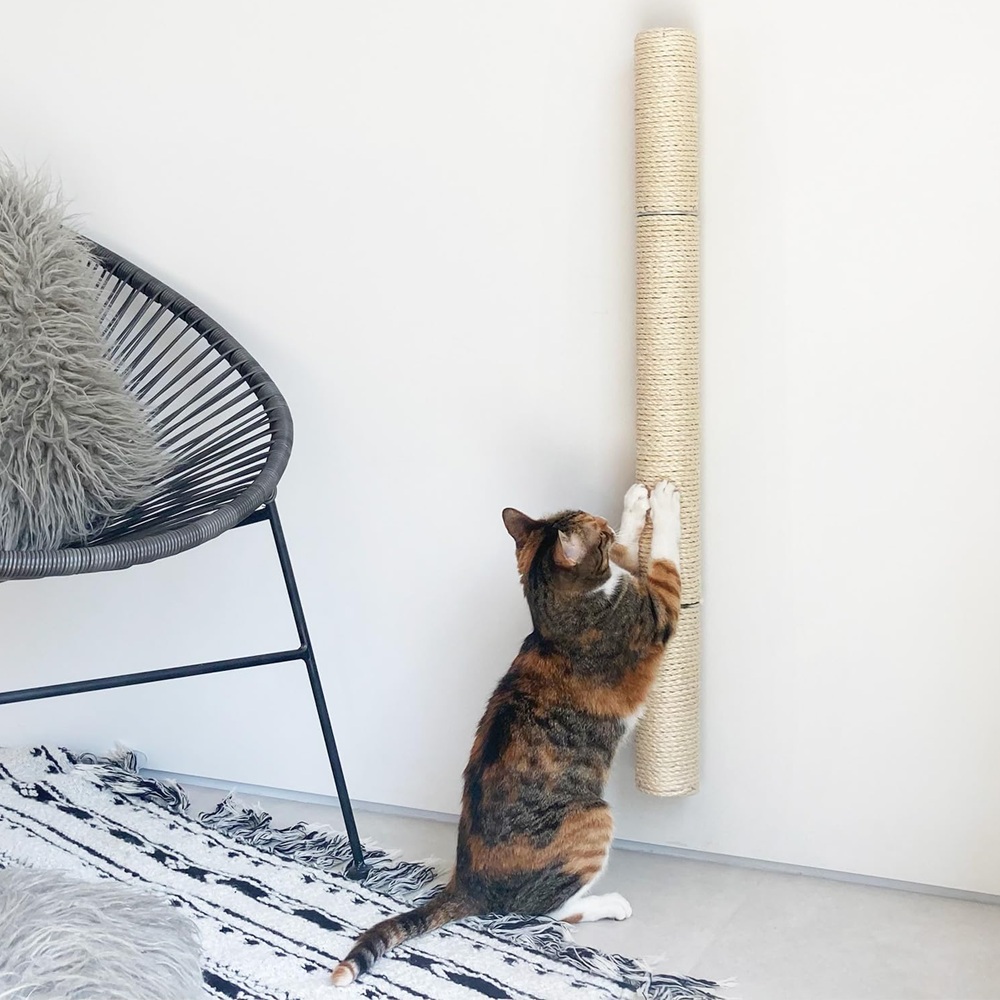
Sizing:
- One size– 2”D x 34”H x 3”W
This wall mounted cat scratcher by Xympo has a pretty basic design, but we still think it’s a good product if you’re looking for something simple. It’s 34 inches tall, so it’s good for most cats, especially tall ones, and it can be mounted as high or low on the wall as you want. It’s also made with sturdy metal brackets and 100% natural sisal to ensure its durability.
As with our previous product, you can also rotate this scratcher to give your cat a fresh scratching surface. You can also buy replacement pieces when the ones it comes with get worn out. It also doesn’t take up a lot of space. However, some cats may prefer a larger scratching surface, and it’s not a good option for cats that prefer to scratch horizontally.
- Great for larger breeds
- Made with durable materials
- Doesn’t take up much space
- Smaller scratching surface
- Some cats prefer horizontal scratching
8. Miwoowim Wall Mounted Cat Scratcher
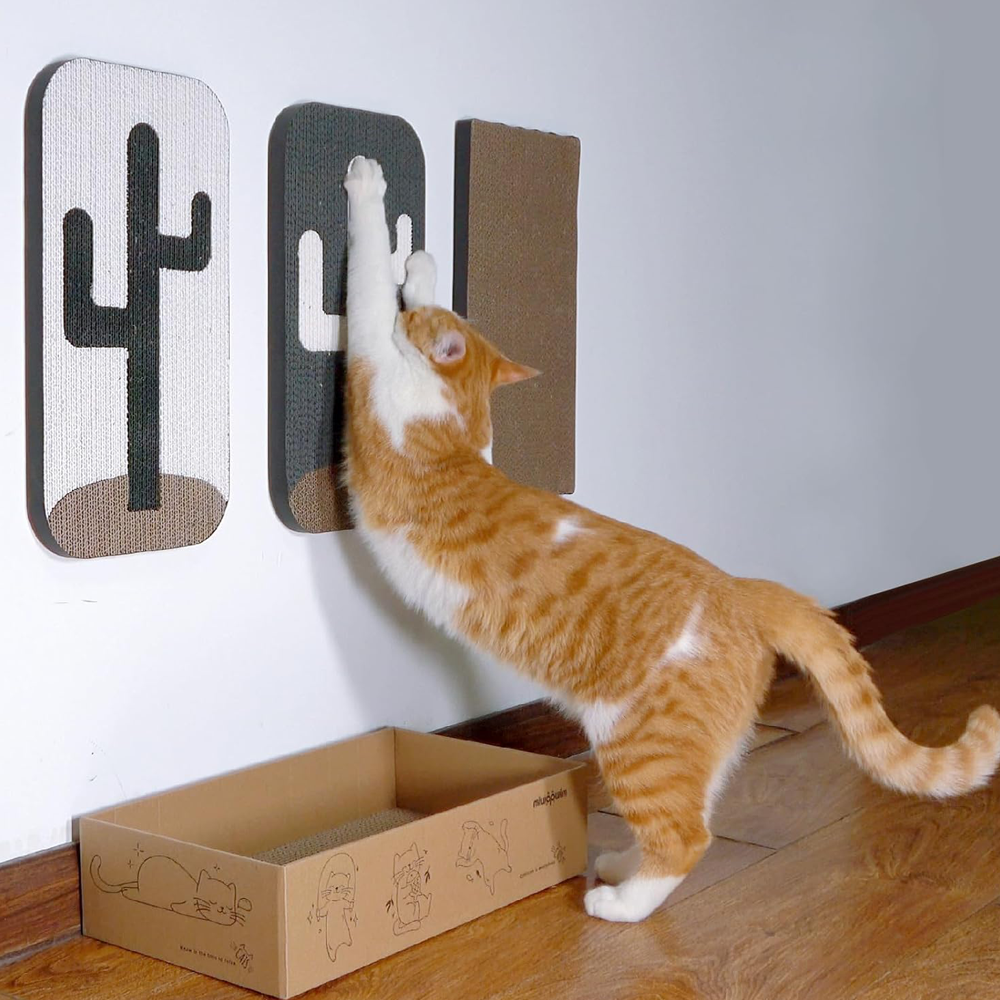
Sizing:
- Scratch pad – 16.2”H x 8.7”W
- Box – 9.1” D x 4”H x 16.6”W
Our final pick for wall mounted cat scratchers is this 4-piece set by Miwoowim. This scratcher set has a design that is both fashionable and functional. You get three scratching pads that you can adhere all together or set them up in different places around the home, but you also get a box that you can adhere to the floor for cats that prefer horizontal scratching, and they can also use it as a bed.
It’s great for multi-cat households, but the cactus design may not suit everyone’s home decor. Also, these scratchers are just made from cardboard, so they may not be as durable, and there don’t seem to be replacement pads available if these get scratched up, but they are pretty affordable considering that you get four pieces. Plus, like other adhesive scratchers, the paint may come off of some surfaces when you try to remove them.
- 4-piece set
- Great for multi-cat homes
- Fashionable and functional design
- Not as durable
- May not suit everyone’s style
- Adhesive may peel paint from the wall

Buyer’s Guide: Choosing the Best Wall-Mounted Cat Scratchers
As a cat owner and lover, you already know that scratching is normal behavior. It stimulates our fur babies and helps them reduce anxiety, trims their nails, and mark their territory. It’s always better to give them a designated scratching post rather than destroy all your beautiful and expensive furniture. Investing in a wall-mounted cat scratching board is a smart move for any cat owner, but how do you know what qualities to look for in order to make your cat happy?
How Many Boards Do You Need?
If possible, it’s usually in your best interest to put a scratching pad in every room of the house that you and your cat hang out in. We know it seems a little excessive at first, but giving your cat multiple options is far better than them deciding that there is a better spot to use. Cheaper scratching pads might not last as long as the more expensive ones, but the investment is ultimately up to you and how badly you want to save your furniture.
Vertical vs. Horizontal Scratch Pads
Some cats like the vertical poles where they can elongate their entire body and stretch it out, while others prefer ones that sit horizontally on the ground. If you’re unsure which kind to go with, start paying attention to your cat’s behavior when they’re scratching. If they climb up the side of your couch, you might consider a vertical pole. If they paw at your rugs and chair arms, then horizontal is probably best. All you can do is take a well-educated guess or figure it out by process of elimination.
The Difference Between Cardboard, Sisal, & Carpet
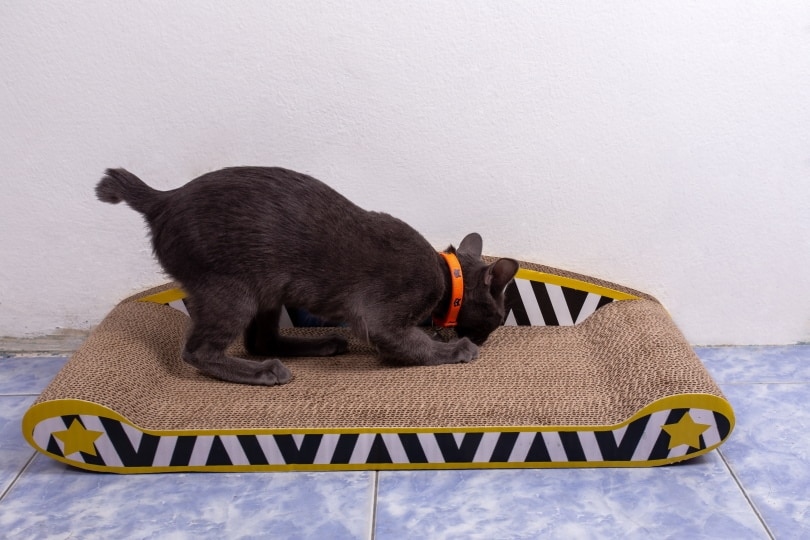
The three materials that almost all scratching posts are made of are cardboard, sisal, and carpet. Each scratching material has its own advantages and disadvantages, and it is up to you to decide what you and your pet like best.
Carpet scratching posts aren’t as popular as they used to be because they often train cats into thinking that all carpet is safe to dig their claws into. Avoid carpet materials if you have expensive rugs in your house. The price of these is usually lower, but there is a good reason for that.
Sisal is the top material found on scratching posts and boards to date. Sisal is a plant fiber and used to make a variety of products like carpets, loofahs, twine, and even dartboards. A lot of companies use sisal rope and wrap it around a pole that secures it with glue or staples. The rope is pretty dense and does a good job at holding up over time. However, it does start to fray and leave fibers around the house sometimes. Woven sisal is newer than sisal rope. The woven sisal is more similar to carpet and is glued or stapled to a wooden post or board. The woven sisal has a more rigid texture than the rope and is often more appealing for your cat and its claws. This fabric also looks a lot nicer and holds up better over time.
Cardboard is the last material that you’ll notice on the market. People are drawn to cardboard because it is more economical and is easy to pick up the remnants. The cardboard is both comfortable to shred and makes an appealing noise that cats seem to love. The downside of cardboard scratchers is that they wear out so much quicker than the other kinds. Some last only a couple of months while others are known to last several years. It really depends on how much your cat uses it.
What Size Cat Scratcher to Buy
As you’ve learned, not all cat scratchers come in multiple sizes. This can be a significant downfall of these products because it is important that cats of all sizes get to use them properly. One of the biggest reasons cats love using scratching pads and poles is because it helps them stretch out all of their muscles. If you have a larger cat breed, many of the products on the market might hinder your pet from experiencing the full effect. Average-sized cats should have posts that are at least 24 inches tall. The larger of a cat you have, the harder it is to find the extra-tall posts that will accommodate their size.
Stability of Cat Scratchers
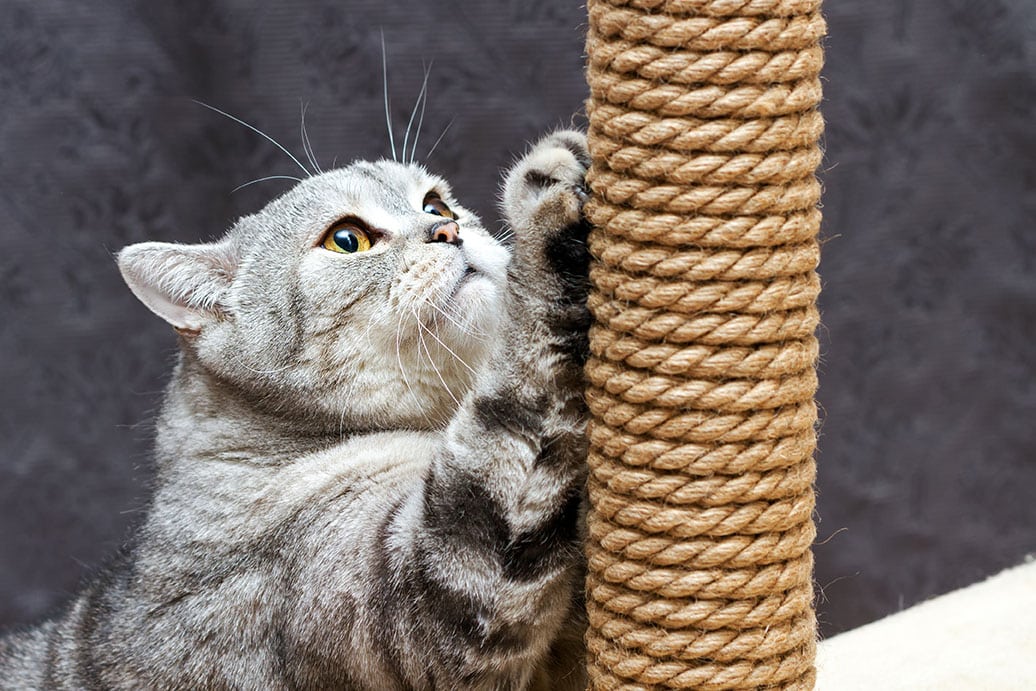
You’d never want your fur babies to get hurt, and unfortunately, if the product isn’t made well, these wall-mounted posts and boards could quickly come tumbling down. Even scratchers that sit on the floor are sometimes wobbly or move around when your cat uses them. Not only is this not safe for them, but it deters your cat from coming back and using it again. Only buy scratchers with large bases or secure wall mounts so that you know that they aren’t going to fall on or hurt your cats in any way.
Final Verdict
We’ve searched high and low for the sturdiest wall-mounted cat scratcher for this year and concluded that the Frisco Wall Sisal Cat Scratcher is the best on the market because of the cheap price, multiple sizes, and sturdiness. If you’re looking for the best scratcher for the money, the Way Basics Eco-friendly Wall Mount Scratch Pad might be the one you’ve been looking for. Not only is it affordable, but it has a new zBoard material that is toxic free, environmentally friendly, and they offer a lifetime guarantee.
The world of cat scratchers is riddled with inferior products that aren’t going to do any good for you or your cat. We’ve done our best to weed out the bad and bring you products that we would feel happy to put in our own homes. There are always going to be hundreds of cat scratchers on the market, but now you can use this list to make your kitty feel like the king of his castle once again.
Contents
- A Quick Look at Our Favorites in 2024
- The 8 Best Wall Mounted Cat Scratchers
- 1. Frisco Wall Sisal Cat Scratcher – Best Overall
- 2. Way Basics Eco-friendly Wall Mount Scratch Pad – Best Value
- 3. 7 Ruby Road Wall Mounted Cat Scratching Post – Premium Choice
- 4. Chngna Cat Scratcher Mat – Best for Kittens
- 5. 7 Ruby Road Cat Scratching Post for Floor or Wall Mounted Use
- 6. FUKUMARU Cat Activity Tree
- 7. Xympo Wall Mounted Cat Scratcher
- 8. Miwoowim Wall Mounted Cat Scratcher
- Buyer’s Guide: Choosing the Best Wall-Mounted Cat Scratchers
- How Many Boards Do You Need?
- Vertical vs. Horizontal Scratch Pads
- The Difference Between Cardboard, Sisal, & Carpet
- What Size Cat Scratcher to Buy
- Stability of Cat Scratchers
- Final Verdict


